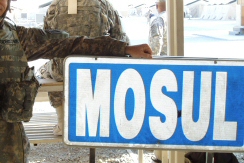 Boko Haram, the Islamic State, Hamas, and other fundamentalist Muslim entities calculate their terrorism to inspire fear. Fear clouds judgement. Most people react in one of two ways, but a few people pursue a more productive third option. The three reactions are:
Boko Haram, the Islamic State, Hamas, and other fundamentalist Muslim entities calculate their terrorism to inspire fear. Fear clouds judgement. Most people react in one of two ways, but a few people pursue a more productive third option. The three reactions are:
- Flight (includes Freeze)
- Fight
- Spiritual Engagement
1. Flight (& Freeze) – “Islam and Muslims are both good”
The “flight” reaction takes the form of denial. It misses how terrorism transcends politics and economics. It can’t see differences between Muslim fundamentalists and other kinds of fundamentalists. Most people in the US State Department, in academia, in the entertainment industry, in the global news media, and in the current American presidential administration are slaves to this emotional reaction. People in “flight” from their fear of terrorism behave according to a conviction that “Islam and Muslims are both equally essentially good.” A great blog by Mark Durie on theological illiteracy shows how their proposed political, economic, and sometimes military “solutions” flee from theological realities and end up undermining security. For example, the popular mantra that the Islamic State does not represent a form of Islam energizes the radicals and absolves the moderates of responsibility for defeating them.
2. Fight – “Islam and Muslims are both bad”
The “fight” reaction advocates a multi-faceted counter-offensive against Muslims who are trying to “take over the world.” Brigitte Gabriel is a spokesperson for this approach. People in “fight” mode behave according to a conviction that “Islam and Muslims are both equally dangerous.” They don’t just strive to diminish Islam, but many of their proposed “solutions” would end up oppressing Muslims. For example, suspending Muslim immigration or preventing the building of mosques infringes on religious liberties.
3. Spiritual Engagement – “Islam is bad but not Muslims”
A third reaction is neither “fight” nor “flight” but an engagement based upon an understanding of Islam and compassion for Muslims. This balance of judgement and mercy transcends normal reactions. Evangelical outreaches to Muslims like “Jesus for Muslims,” “Act Beyond,” “Crescent Project,” “COMMA Network,” and “Adopt a Terrorist For Prayer” behave according to a conviction that “Islam is bad but not Muslims.” They understand how even the “peaceful” moderate Muslim majority is in bondage to an oppressive theology. That theology, even when peacefully expressed, opposes freedom of conscience, freedom of speech, and freedom for women at its fundamental core. It is deeply rooted in places like Saudi Arabia and Pakistan that are beyond the reach of either military or civic interventions. Therefore, the lasting solution to acts of terror in the name of Islam is not military, economic, or political, but theological. Spiritual changes precede material ones. Meeting the suicidal zeal for an Islamic state with a comparable Pauline zeal for evangelism among Muslims will facilitate those spiritual changes.
- Social Implications of Different Christian and Muslim Beliefs
- Landscape of Islam
- Video on Understanding Muslim Terrorism
Post Script
These three responses, explained above, are not exclusive or exhaustive, and they are descriptive rather than prescriptive. My recommendation of Spiritual Engagement as “a” pathway to “lasting solution” does not exclude supporting secular (military, political, and economic) engagements that are theologically literate and help to free Muslims from Islam. However, secular engagements without spiritual ones don’t address underlying causes and won’t likely create lasting change.







 Act Beyond
Act Beyond http://www.faithandwar.org
http://www.faithandwar.org Mark Durie's Blog
Mark Durie's Blog Military Missions Network
Military Missions Network The Christian Fighter Pilot
The Christian Fighter Pilot The Navy Christian
The Navy Christian